Inter-regional Project for Participatory Upland Conservation and Development (PUCD)
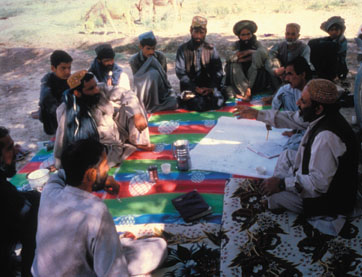
Summary
The project was designed as a pilot process-oriented initiative. Throughout its three different phases, it was guided by the main objective to identify and test methods and techniques for participatory sustainable management of upland watersheds.
The Inter-regional Project for Participatory Upland Conservation and Development (PUCD project) was implemented in selected areas in Bolivia, Burundi, Nepal, Pakistan, and Tunisia from 1992 to 1997, with a two-year follow-up phase from 1998 to 2000 in Bolivia, Tunisia and Nepal. It was launched by the FAO/Italy Programme which looked to promote, through bilateral and multilateral channels, initiatives for meeting basic needs and protecting the environment using a participatory and integrated watershed management approach (PIWM).
The project’s immediate objectives in each of the countries were to:
- To initiate and consolidate pilot processes for participatory and integrated watershed management.
- To include the participatory and integrated watershed management approach into national policies for the development of rural areas and the conservation of natural resources, and into decentralized planning systems.
- Spread information on the methods, techniques, and tools verified by field measures to reproduce them in other areas through communication and training initiatives.
With the guidance and support of a National Field Team (NFT) and other stakeholders, interested community members were largely entrusted with the responsibility of implementing the solutions. These solutions included diverse measures according to the specific needs of each region, however, they all focused in two main areas of activity:
- Improving farming systems through different incentives, on-farm trials, and related activities that looked to find a balance between environmental and economic needs.
- Managing common property resources (CPRs).
Activities included the regeneration of public forests and rangelands, control of the effects of erosion, and management of streams through small-scale, community-based civil works.
Moreover, despite the core component of the PUCD project focusing on natural resource management, it also looked to support some other initiatives that helped to satisfy the basic needs of the population. These included income gathering activities, and the improvement of local infrastructure and health, sanitation and education services. Particular attention was given to the participation of women in the activities.
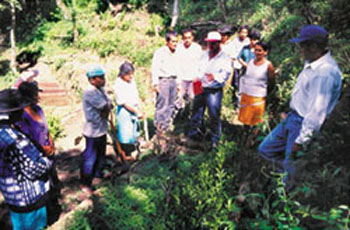
Photos: FAO
Photos: FAO
Overview
- Implementation sites:
- Multiple countries
- Single location
- Mountain region:
- The Andes, Mahembe mountains, the Himalayas, Sulaiman Range
- Province:
- Santa Cruz Department in Bolivia, Makamba Province in Burundi, Gorkha District in Nepal, Mastung District in Pakistan, and Zaghouan Governorate in Tunisia
- Site locations:
Upper and Middle Pirai River in Bolivia, Rwaba River in Burundi, Bushunde Khola and Maudi Khola watershed in Nepal, Kanak Valley in Pakistan, and Oued Sbaihyia watershed in Tunisia
- Solution scale:
- Ecosystem type(s):
- Solution type(s):
- Climate impact(s) addressed:
- Impact time-scales:
- Co-benefits:
- Implementation timeline:
- 1992 - 2000
Solution details
Main beneficiaries & outcomes
Main beneficiaries within the 5 participating countries were the 67,600 local community members including numerous ethnic groups.
Thanks to the participatory approach of the project, the local population saw their adaptive capacity enhanced through joint-learning from and with other stakeholders, and through the experiences obtained. The project paid special attention to those initiatives promoting the economic independence of women, decreasing their workload, and improving their living conditions. Likewise, the general collaboration of women in the distinct phases of the project was equally promoted.
Planning and implementation
Countries originally participating in the project included Bolivia, Burundi, Nepal, Pakistan, and Rwanda, however, due to safety issues, Rwanda had later to be replaced by Tunisia for the second phase (1994-1997). Early in the process, some collaborative initiatives in conservation and development carried out in upland regions during the 1980s by FAO and the Italian Cooperation, served as the project’s foundations by providing critical initial knowledge. Such is the case of two previous studies on People and the Environment conducted by the FAO’s Forestry Department and the FAO/Italy Panel in the Himalayas and the Andes.
For each of the participating countries, a Small Coordination Unit provided field components with operational and technical assistance throughout the entire course of the project, while a National Field Team (NFT) ensured that lessons seized could be applied. Yearly work plans were arranged by each NFT by making use of participatory assessments, planning, implementation, evaluation, and re-planning exercises. Different stakeholders were involved, including local communities, grassroots, organizations, the private sector, local authorities, non-governmental organizations, and other development institutions.
Among the first steps of the project, and given the existence of some uncertainties, information concerning the socio-economic and environmental situation of project areas was gathered, complementing in some cases with rapid assessments of specific issues. Based on this information, communities and sites for implementation were selected, validated, and visited.
Later, the project was implemented in three different phases:
- The first phase and first half of the second: the project focused on field work at the grassroots level. Techniques and tools for participatory research and decision-making were identified, followed by the creation of a strategy covering a wide range of conservation and development issues. A participatory process for monitoring, evaluation, and re-planning was established.
- Last half of the second phase and third phase: efforts were concentrated on promoting the collaborative dimension of participatory and integrated watershed management, shifting activities from the community level to an intermediate administrative level and national-level policy-making. This measure had the intention to ensure the continuity of project experience after the withdrawal of international support. Punctual activities included identifying and testing measures that would enable local institutions to continue providing effective support to the local participatory process, promoting forums for discussion and decision making for coordination and activity development, and assisting in the incorporation of the approach to participatory and integrated watershed management into national policies and legislation.
For all of the field projects, the responsibility for implementing solutions was largely entrusted to those interested community members.
Finance
Financial resources resulted from different sources like international agencies, local line agencies, NGOs, and communal governments. The different budgets available for the three phases of the program were as follows:
- USD 3,800,00 for an initial period of two years (1992-1994)
- USD 6,200,000 for the second phase in 1994-1997.
- USD 2,000,000 for the third phase from 1997-2000. In this phase, only Bolivia, Nepal, and Tunisia were included due to their greater potential for effectively institutionalizing the project’s approach and exercise.
Innovation
This project was considered innovative at the time of implementation given that little experience existed at the international level in implementing similar participatory processes. Moreover, the project was also one of the earliest attempts to implement the ideas endorsed in 1992 by the Agenda 21 of the United Nations Conference on Environment and Development (UNCED).
Performance evaluation
For evaluating the performance, progress and outcomes of solutions, and plan new implementation cycles based on findings and experience, the National Field Team (NFT) developed a participatory monitoring, evaluation, and re-planning system at the community level that included the progressive testing and validation of solutions. As these activities were carried out by community members, special attention was paid to those testing criteria and procedures simple enough to be incorporated into the regular activities of farmers and local institutions.
Long term project sustainability and maintenance
To ensure the viability of the project, rapid environmental and socio-economic assessments were carried out at the beginning of the project, complementing some already available information. While the long-term sustainability of the different solutions implemented through the project was secured mainly by the strengthening of social, institutional, and political capacities to self-organize, cooperate, implement, and monitor measures even without the support of international organizations.
Furthermore, by using a self-assessment method, the PUCD learned that the participant’s capacity to monitor their own plans and activities was essential for the sustainability of participatory processes, and that it also favored a good relationship among partners.
Capacities for design and implementation
Knowledge
The role of knowledge was important along the whole process of the project and for all of the participating countries. Not only did it serve to prepare the ground for project implementation, but it also allowed the successful execution of measures from learned lessons and experiences. However, equally significant was the transfer and steady flow of information among the different stakeholders involved across levels.
To ensure the effectiveness of the participatory processes, technical support was provided by each National Field Team (NFT) to local communities and interested members for choosing, implementing, monitoring, and evaluating solutions. Particular attention was as well given to catalysing the integration of indigenous and scientific knowledge when possible.
Technology
Because most of the solutions were implemented in rural mountain communities, high-end technologies were largely not used. Instead, simple and available technologies within the communities were employed on certain occasions and for some of the solutions, accompanied by technical assistance. Nevertheless, in some of the regions, like in Tunisia, the adoption of technology faced several obstacles such as technical and operational problems, and resistance from the population that did not see new technologies as a priority need for the community.
Political / Legal
Thanks to the participatory approach of the project, local political authorities were closely involved in the project components, for example, they participated in the workshops with other interest groups for planning and evaluation. From the begging of the project, efforts were made to assist national policy-makers in the development of an enabling political environment that would help to secure the success of solutions in the long term, which could be considered as an important outcome. To this end, it was necessary to create and enforce regulations that could support the establishment and development of participatory and integrated watershed management process.
Moreover, lessons grasped by the project show that political will facilitates the efforts aimed at making national policies more supportive of participatory and integrated watershed management.
Institutional
Institutional capacities were without doubt one of the most significant enablers of the project. Throughout the entire course of the process, a small Coordination Unit provided the national field components with operational and technical assistance and enabled exchanges among field teams, FAO technical units, and other international organizations and NGOs. Likewise, a National Field Team was also stabilized in each country. These teams closely facilitated the yearly participatory exercises that allowed the elaboration of work plans, and guided and supported local communities for choosing, and implementing solutions. Taking this approach was fundamental for empowering communities and enhancing social sustainability.
The strengthening of the structure and operational capacities of grassroots organizations was in fact one of the main objectives of the project. To this end, the PUCD team helped other stakeholders in assisting with internal operations and legal issues, managerial capacity building, micro capitalization, facilitation of linkages among groups and organizations, as well as organizing communication activities.
Finally, experiences gained during the project demonstrated the significance of including all social actors and institutions in the participatory processes for sustainable development and natural resource management rather than focusing only on local communities. It also demonstrated that institutional capacity at the local level was necessary to establish effective links for inter-sectoral collaboration, and that it depended on the willingness and capabilities of local institutions.
Socio-cultural
The collaboration and organization capacities of local communities were a key element for the selection, realization, and fortune of the solutions. Since the first phase, thanks to the participatory approach in which the project was designed, most of the information collected, and the selection of activities, resulted from the interaction among small groups of local participants and members of the National Field Teams (NFT) that guided and supported this process. In addition, the different tasks to be carried out were directly chosen based on the individual interest, competences, and preferences of participants. Moreover, interested community members were as well delegated the responsibility of implementing solutions, providing most of the local resources and labour needed, and taking charge of management actions.
The project paid special attention to strengthening the adaptive and coordination capacities of the local population for the long-term achievement of the solutions as well as possible replications in the future. Numerous workshops, educational and awareness activities were carried out for this purpose.
Outlook & Scalability
Barriers and adverse effects
In the initial steps of the project, the environmental and socio-economic assessments for each of the communities had the intention to reduce the probabilities of adverse effects. Nevertheless, multiple barriers were encountered along the process in most of the countries. Some of the examples included the non-participatory attitude of local institutions, communities and sometimes project staff, and other numerous issues related to the cultural and social aspects of communities. For example, the case of the strong role differences between men and women in Pakistan and Tunisia, and the caste stratification in Nepal. In response to these and other particularities, solutions had to be adapted or created taking into consideration these characteristics and to avoid issues.
In the specific case of Burundi, the implementation of the project was negatively affected by the civil war starting in 1994. However, the project was able to proceed and peace was maintained thanks to the tradition of co-existence among the ethnic groups of the area, and due to the cooperative links created through the project between communities and institutions.
Transformation and future outlook
This project supported a fundamental change in climate change adaptation in mountain regions by enhancing the social, political, and institutional adaptive capacities, and by leading to a profound change away from the way natural resources and development was managed in the past. The adoption of a new approach that takes into account the viability of solutions for future generations can help to ensure that future measures and policies are more sustainable.
Potential for upscaling and replication
Experiences, lessons, and knowledge gained through the PUCD proved useful for later replications in other regions of the participating countries as it was done in La Palmira watershed in Bolivia, as well as for the integration of the Participatory Integrated Watershed Management (PIWM) approach into different national plans, policies, and other programmes. This is especially true given the fact that the solutions were in fact conceived as pilot projects with the intention to extract lessons that could be replicated.
Some of the main lessons secured from the project’s experiences that could be useful for further replications, and to integrate the PIWM approach include:
- When designing a workplan that puts into action the learning process that took place during the participatory appraisal, responsive attitudes, mutual trust and good facilitation skills are necessary among community memebers and other participating stakeholders.
- At the start of the project, staff must facilitate community-level PME activities. However, the responsibility for organizing and implementing such activities should be delegated to trained community members as soon as possible.
- A participatory evaluation should focus on the participatory process itself, on the technical quality of the work performed and, when possible, on the effectiveness of the activities (i.e. the degree to which the objectives were achieved). Rural people have a strong capacity to make sound judgements about their work and its results. However, evaluation may be a culturally sensitive activity, paying special attention to establishing a synergy between participatory evaluation exercises, and indigenous informal evaluation practices.
Finally
Acknowledgments
This survey was elaborated based on the Case Study of the FAO/Italy Inter-regional Project for Participatory Upland Conservation and Development (PUCD), written by Patrizio Warren and published in 1998 by the Food and Agriculture Organization (FAO), and on the project’s description available in the FAO’s website. The solution description reflects the authors’ views and not those of the author, the FAO or the PUCD project collaborators. Julia Aguilera Rodriguez filled the survey, while Simon Allen revised the solution description.
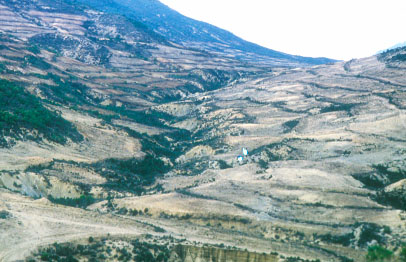
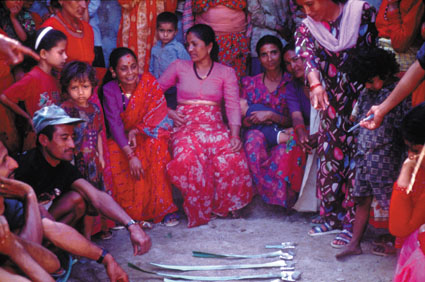
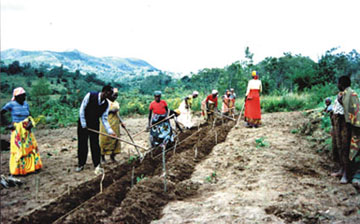





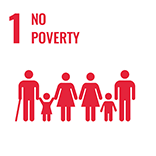
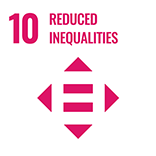
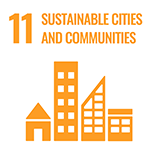
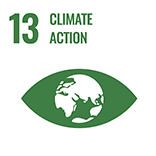
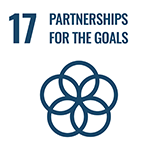

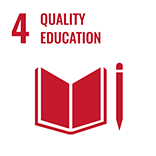
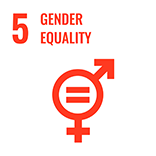
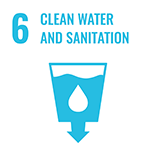
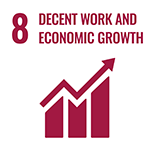
(0) Comments
There is no content